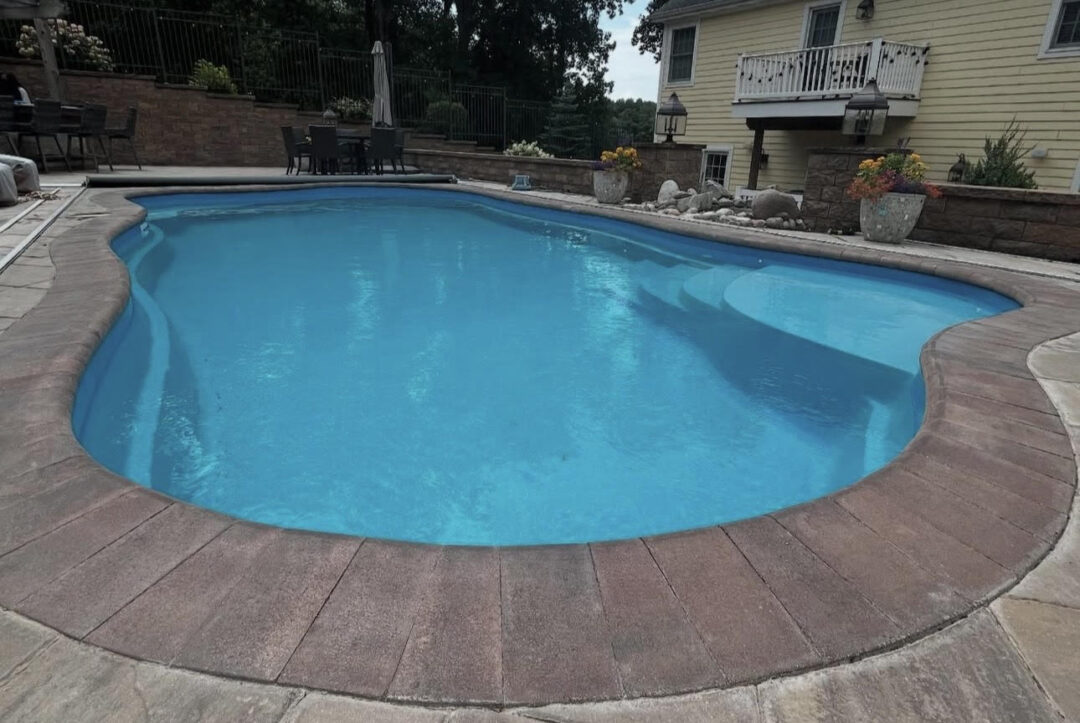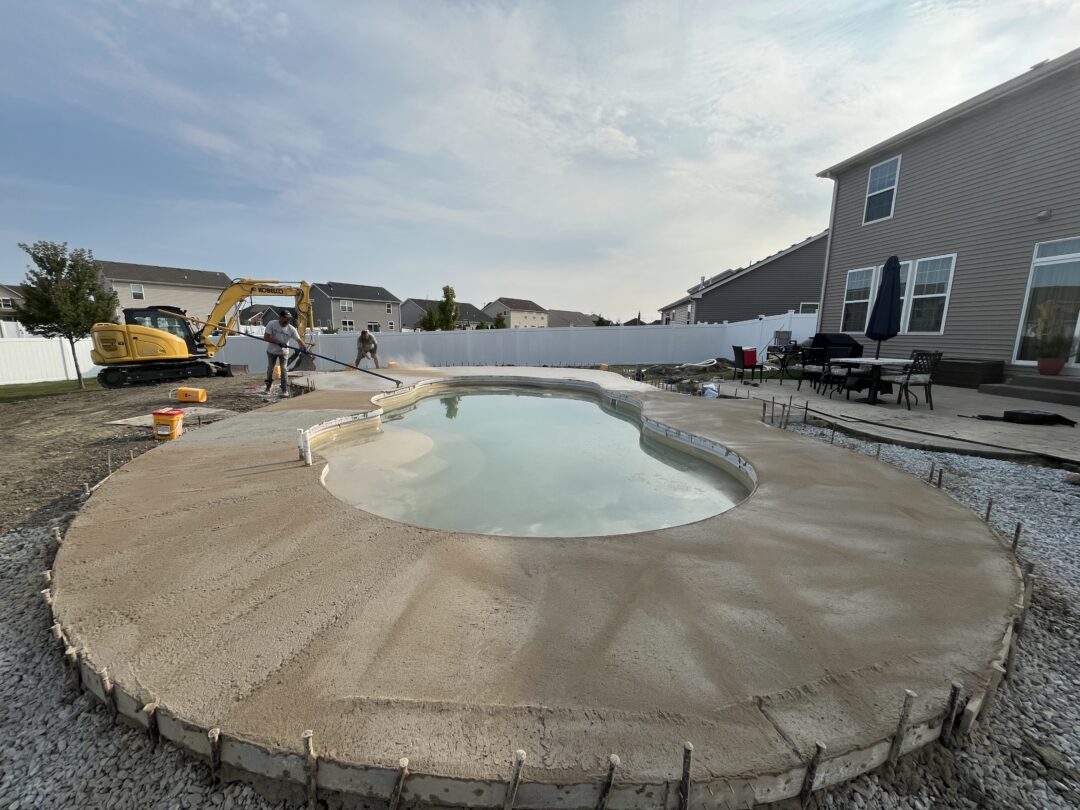Guide to Freeform Fiberglass Pools: Pros, Cons, Top FAQs

If you’re considering purchasing an inground swimming pool, you have got a lot to consider. For years, concrete and vinyl liner pools dominated the marketplace. I mean, think about it, you can essentially craft a concrete or vinyl liner pool to look like whatever your heart desires.
Customizability is a huge draw for a lot of prospective pool buyers. Fiberglass pools are not customizable the way concrete and vinyl liner pools are. However, you can still find many freeform fiberglass options that will meet your needs.
Freeform designs can give your backyard space a truly unique natural oasis look to it. In case you’re still skeptical about fiberglass pools, we would like to answer some of your questions and address some concerns. A pool is all about functionality. You should get the pool that is right for you, your yard, and your swimming needs.
At Royal Pools G2 Landscaping, we install inground fiberglass pools all summer, several of which are freeform designs. If you’re considering an inground freeform fiberglass pool, you’ve come to the right place. We are here to help answer your questions. So without further ado, let’s dive in!
1. What is a freeform fiberglass pool?
A freeform fiberglass pool is an inground pool made from a pre-molded fiberglass shell. Manufacturers design them to look like natural water. These pools have a curvy shape that imitates ponds, lakes, or other natural water features. Unlike classic shapes like rectangular, Roman, or oval, freeform pools seamlessly blend into your outdoor living space.
2. How are freeform fiberglass pools made?
Standard with all fiberglass construction, freeform fiberglass pools are manufactured by layering fiberglass strands infused with polyester or vinyl ester resin into custom-designed molds inside controlled warehouses specializing in fiberglass construction.
The shell is then reinforced using a strong resin (typically vinyl ester resin) and finished with a gel coat, guaranteeing the highest level of durability, comfortability, and ease of maintenance. After curing, the shell is transported via freight to your residence for installation.
3. What sizes and depths are available?
Freeform designs typically range in size from small plunge pools (10×20 feet) to large family pools (16×40 feet). Depths vary significantly, generally between 3 to 8 feet, often featuring sloping floors or designated shallow and deep ends.
4. Are freeform fiberglass pools durable?

Vinyl ester resin makes fiberglass pools extremely durable. Fiberglass pools by nature are resistant to cracking, chipping, and fading. A fiberglass pool will stay durable so long as you keep the water balanced and care for it properly.
5. How long does a freeform fiberglass pool last?
With proper maintenance and care, a fiberglass pool can typically last 30–50 years or more. Most manufacturers offer warranties ranging from 25-30 years to lifetime guarantees.
6. Can freeform fiberglass pools accommodate pool accessories?
Absolutely. Freeform pools can accommodate all the classic pool accessories, including: waterfalls, tanning ledges, built-in spas, and benches. They can also have pool lighting, automatic covers, heaters, and advanced filtration systems.
7. Are freeform fiberglass pools difficult to maintain?
No. One of the advantages of fiberglass pools is ease of maintenance. Their smooth, nonporous surface resists algae growth and staining, reducing chemical usage and maintenance time significantly compared to concrete or vinyl liner pools.
8. How long does installation typically take?

Installation of a freeform fiberglass pool typically takes about 2–4 weeks from start to finish. The actual pool shell installation typically happens in just a few days, but preparation, excavation, plumbing, electrical setup, backfilling, and decking may extend the overall timeline.
9. How much do freeform fiberglass pools cost?
Broadly speaking, the total cost of a freeform fiberglass pool installation ranges between $80,000–$95,000. There are a lot of factors that can add to the cost such as the size of the pool, the state of your yard, the time it takes to install, additional features, etc.
Luxury features like integrated spas, waterfalls, lighting, additional landscaping, or automatic pool covers increase the overall investment.
10. Can freeform fiberglass pools have deep ends or diving boards?
Yes, freeform pools can include deep ends. However, diving boards typically require pools that meet minimum depth and length specifications (usually at least 8 feet deep in a specific diving area). Some freeform fiberglass pools meet these standards; always verify with your pool manufacturer.
11. Can I customize the color of my fiberglass pool?
Yes, most fiberglass pool manufacturers offer a range of gel coat colors, typically in shades of blues, grays, tans, and whites, allowing you to choose a hue that complements your landscape and personal style.
12. Who are the leading manufacturers of freeform fiberglass pools?

Top manufacturers include:
Pros and Cons of Freeform Fiberglass Pools
Pros:
- Natural look
- Extremely durable
- Limited maintenance
- Skid-free surfaces
- Compatible with salt-water generators
- Quick installation time
- Energy efficient
Cons:
- Limited swim space because of shape
- Limited design options
- Upfront cost
- Can crack or pop out of the ground if not properly installed or built
Conclusion
No product is perfect. When it comes to swimming pools, you will have to make sacrifices to get what you are looking for. A freeform pool provides a unique, luxurious look that you simply cannot get with most other pool designs.
If you were unfamiliar with freeform pools prior, we hope this article piqued your interest. If you have more questions about fiberglass pools, check out the articles below. For more educational content on all things pools and landscaping, visit our learning hub at the top. Have a great day!
What Is A Fiberglass Pool Shell?
5 Awesome Rectangular Fiberglass Pool Designs in 2024
Why Do Fiberglass Pools Cost More Upfront?
written by Logan Edgemon
